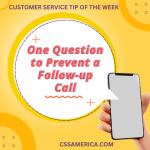You have a marketing plan, a social media presence, and sales program. But do you have the same structures in place for retention?
In a recent Body Shop Biz article, the Toronto Area Dealer Association’s “Renewit program” is noted because it focuses on how the association is helping members to increase customer retention, sales, and profits. Among other features, the program directs the customer’s vehicle back to the dealership after a breakdown or wreck.
Now whether the program turns out to be as great as advertised is not yet known, but there is much to be learned from the program.
First, you have to have solid data on the customer and the product/service they purchased in order to communicate most effectively with them – make sure these details are acquired during the sale and effectively flow to your customer service systems.
Second, make it easy for the customer to contact you back if they have an issue. You’d rather resolve the issue and keep the relationship than have them go elsewhere today for support, since that might make them go elsewhere tomorrow for a product.
Third and more broadly, view your customer service functions as revenue-building entities that should have the goals, technology, people, and processes that focus on staying in touch with clients, meeting after-the-sale needs, and deepening relationships.
Build your own great customer service body shop.
Read our New Book – “Ask Yourself…Am I GREAT at Customer Service?” http://www.amigreatat.com/
Interested in improving your company’s customer service? See more at our new website! http://www.cssamerica.com/





















